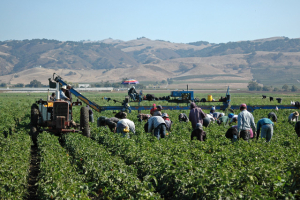
Food Movement Gains Ground Despite Resistance
March 12, 2015 Michael R. DimockThere are many signs that the food movement is having its intended impact AND we have much more to do to achieve a healthy, equitable and resilient food system. You may have heard that the Hersey’s Chocolate Company rejected GMOs and its Kisses will soon be free of genetically engineered ingredients. This is notable because they had invested one million dollars in stopping GMO labeling initiatives. Burger King recently removed sugar-sweetened beverages from its kid’s menu. Nestle is phasing out artificial coloring and flavoring and Walmart is raising its minimum wage a bit. This is all welcome progress.
But in my mind the biggest news is that McDonald’s is on the ropes. Its US sales are down 4 percent year over year and it recently fired the CEO. The new guy at the helm has unleashed a company makeover, announcing last week that they will ban the use of “human” antibiotics by its chicken producers. Within days of that announcement, franchisees terrified by the shifting landscape of the food economy stated that the company would soon add a kale-based product to its menu. We are witnessing system disruption.
Some of the credit must go to companies like Chipotle, which have created the fast casual sector with a commitment to health and sustainability. But the food movement can also take credit for creating the context. Several nonprofits are running market-change campaigns using petitions that target specific brands or government agencies. One reason these campaigns have impact is that lesser known, but highly specialized nonprofits like Sustainable Food Lab and Future 500 are helping executives from major corporations reform their supply chains and focus on sustainability. In addition, the work of media-oriented nonprofits like Civil Eats, Food and Environment Reporting Network and commentators like Mark Bittman and Michele Simon cannot be underestimated. They get the public’s attention, day after day, educating to build support.
Critically, there is a whole different tribe of nonprofits organizing communities, food producers and individuals to advocate and pressure policymakers. Some work at the federal, others at the state level. There are literally thousands of groups like food policy councils, local farm to school and food justice advocates that work on the front line at the community and neighborhood level to implement projects and campaigns to create change. Together these market and policy oriented “changemakers” are successfully altering the context and building momentum for system transformation.
But change is scary for those being asked to do it, particularly when there are billions of dollars at stake. So resistance is also intensifying. We see increasingly vicious attacks that seek to delegitimize those challenging corporate power. The best example may be attacks on scientists who challenge that there is a “consensus” that GMOs are risk free. Also there is an attempt to manipulate meaning and take control of food movement themes. The most blatant I’ve seen is this McDonald’s television commercial that claims that their stores can bee seen as authentically local and indigenous to a small town like Petaluma in Sonoma County, California. It’s a cynical reversal of the intention of the locavore, go-local advocates who aim to cultivate the growth of locally owned and unique businesses that retain wealth in communities rather than allow its extraction. I believe that both tactics are short sighted and will fail to win over the public.
What’s important now is that the food movement realizes that these attacks and attempts to manipulate are a good sign. They indicate we are winning. So take heart, hold the line and please do even more to grow the movement.



